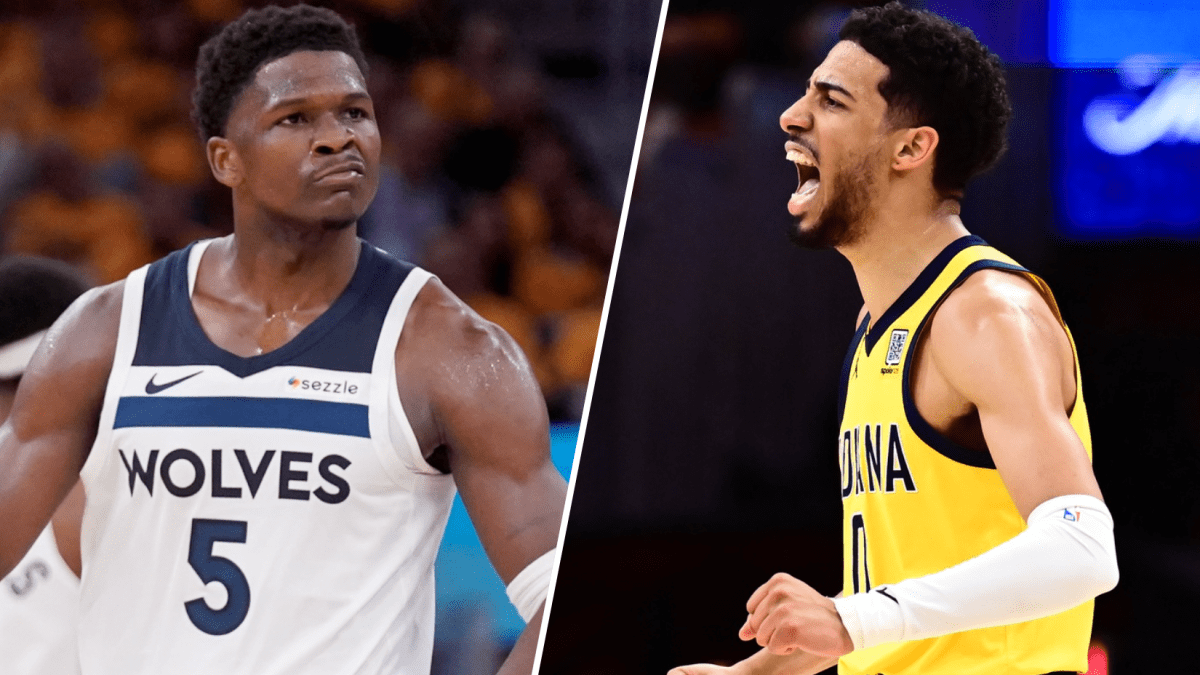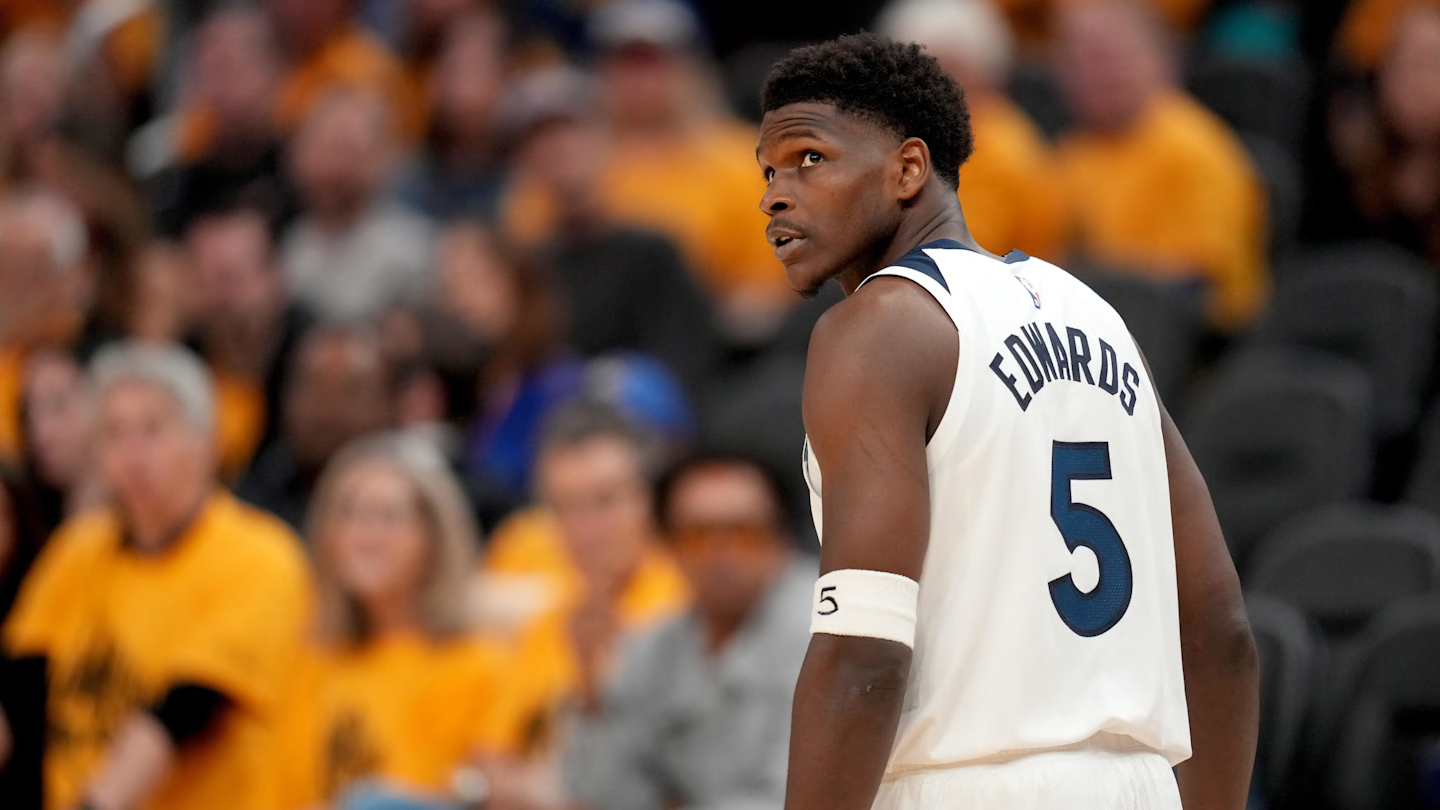
Welcome to Layup Lines, For the Win’s basketball newsletter. Subscribe here to get it delivered to your inbox every Monday, Wednesday, and Friday. Here’s Robert Zeglinski.
I won’t lie to y’all. I can’t remember the last time I had more fun watching an NBA postseason than this one.
It has fittingly culminated with two conference finals series featuring a juggernaut (the Oklahoma City Thunder), underdog small markets all around, and perhaps the league’s most passionate fan base (the New York Knicks) sitting in the spotlight.
But for me, the story of this year’s conference finals centers around the electric Anthony Edwards.
With all due respect to everyone else still vying for this year’s Larry O’Brien Trophy, Edwards feels like he’s following a classic “Chosen One” path. That the superstar and former No. 1 overall pick is trying to ascend the throne for the once-fledgling Minnesota Timberwolves, who reside in a state accustomed to comically falling flat with most of its professional sports teams, makes this seem like destiny.
For all intents and purposes, Edwards’ Timberwolves are already the best team in franchise history. After making a surprise run to last year’s Western Conference Finals, their appearance in this year’s semifinals is the first time Minnesota has ever made it to the NBA’s final four in two consecutive years.
Yes, part of that success stems from a relentless mentality instilled by underrated head coach Chris Finch. Yes, it helps that the Timberwolves play a physical brand of basketball that flat-out bullies their opponents sometimes. And yes, it’s great to have a depth chart littered with rejuvenated reclamation projects like Julius Randle, great development stories like Jaden McDaniels, and steady veterans like Mike Conley.
Everyone in Minnesota deserves some measure of credit for building one of the Western Conference’s new powerhouses that has put itself on the brink of the NBA Finals once again.
But it’s Edwards who should get the lion’s share of praise compared to everyone else.
Now in his fifth NBA season, Edwards has transformed into one of the game’s most efficient scorers.
Not only can he use his speed to get to the rim at will, but he’s also become a lights-out shooter who can step back into a good shot whenever he wants. For someone who already puts nonstop pressure on the basket, it feels unfair that he led the NBA in 3-point makes this season. Throw in Edwards’ eager willingness to often stack the toughest defensive assignment on top of his scoring workload, and you have the definition of a two-way star.
But where Edwards has most improved is his playmaking. That, above all other evolutions of his game, will decide whether Minnesota can make a finals run. In the past, opposing defenses could bracket Edwards away from the play with a well-timed trap or double-team. In these instances, he would usually panic and either lose the ball, toss up a tough shot, or throw a grenade to a teammate in an impossible shooting position.
It was a foolproof strategy to stymie Minnesota’s disorganized offense.
This year, Edwards has never looked more comfortable against teams, saying, “We’ll get beat by anyone but him.” He’s making that extra pass to keep the ball in rhythm. He’s threading the needle to someone open in the paint. He’s splitting double teams before they even have a chance to set up and putting the entire defense in a compromised position before dropping a dime to one of the Timberwolves’ many lights-out outside shooters.
It’s no wonder he’s been averaging nearly six assists with just over two turnovers per game this postseason, which is by far the best split of his postseason career so far. He looks like a complete offensive player for the first time.
The Thunder are the plucky Timberwolves’ most daunting test yet. Aside from the Timberwolves themselves, they have more elite defenders to throw at a player like Edwards than anyone else in the NBA. They will do everything possible to make Edwards’ life hell. And they’ll never stop coming.
But if anyone can withstand Oklahoma City’s onslaught and lead Minnesota to its first-ever NBA Finals appearance, it’s him.
After firing their head coach and general manager right before the playoffs, the Nuggets had no business making as much noise as they did. First, they supplanted the league’s “hottest team,” the L.A. Clippers, with force in the first round. Then, with an unfathomably thin rotation, they somehow put the steamrolling Thunder on the ropes before running out of gas in Game 7. Denver’s effort was admirable.
The Nuggets deserve a lot of credit for turning a once-dead season into something meaningful. That matters. But on the other hand, they have now suffered a second consecutive second-round loss in a familiar fashion. Their top-heavy roster couldn’t hold up through the entire grind of the playoffs. When push came to shove, the Nuggets didn’t have enough viable players for the biggest games.
It feels significant to me that Nikola Jokić, the league’s best player, decided to call this Nuggets’ depth issue out in his season-ending press conference:
“We definitely need it [depth],” Jokić said. “I think we played for so long in such a way that it’s hard for guys to step up, especially in the playoffs … it seems like the teams that have longer rotations, a longer bench, are the ones who are winning. Indiana. OKC. Minnesota.”
Phew. I should note that Jokić didn’t necessarily say this from a place of irritated frustration. In fact, he says most things very matter-of-fact when taking the context and his mannerisms into account. But let’s not lose sight of a three-time league MVP saying his team, once again, didn’t have enough outside of their core in public.
It’s a lot easier said than done, but the Nuggets desperately need a productive summer this year if they’re going to capture a second championship with Jokić at the forefront.

